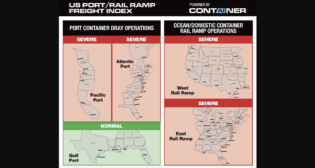
EHH: Is CSX next? Let the speculation begin
Written by William C. Vantuono, Editor-in-ChiefMonths before his previously announced official retirement as CEO, Hunter Harrison has abruptly severed all ties with Canadian Pacific, handing the company’s reins to President Keith Creel. According to numerous reports, Harrison will attempt to take control of CSX, which in 2014 had rebuffed a merger attempt by CP.
The Wall Street Journal reported late on Jan. 18 that activist investor Paul Hilal, principal of hedge fund Mantle Ridge LP—and formerly with William Ackman’s Pershing Square Capital Management LP—is teaming up with Harrison to target CSX for a management switch. The WSJ’s report followed CP’s announcement that Creel will become President and CEO effective Jan. 31, 2017 following Harrison’s decision to retire from CP.
Harrison “will take vacation leave effective immediately until Jan. 31, 2017, and Mr. Creel will assume the CEO’s responsibilities during this period,” CP said in an announcement. “Mr. Harrison had approached the [CP] Board to discuss his retirement from CP and potential related modifications to his employment arrangements that would allow him to pursue opportunities involving other Class I railroads. A special committee of the Board oversaw discussions with Mr. Harrison. Following negotiations, receipt of independent legal advice, and careful deliberation, the special committee recommended to the Board that CP enter into a separation agreement with Mr. Harrison.
“Under the terms of the separation agreement, CP has agreed to a limited waiver of Mr. Harrison’s non-competition obligations. In consideration of the waiver Mr. Harrison has agreed to terminate all roles he has with CP and forfeit substantially all benefits and perquisites he is entitled to receive from CP going forward, including his pension. In addition, Mr. Harrison has agreed to surrender for cancellation all of his vested and unvested equity awards, except for a portion of his vested options he was granted upon arrival at CP in June 2012. The total value of benefits and awards forfeited by Mr. Harrison is approximately C$118 million (US$89 million), with the value of the equity awards surrendered calculated based on their in-the-money value relative to the current trading price of CP’s shares.
“The previously agreed consulting agreement between CP and Mr. Harrison will not take effect and Mr. Harrison will not be providing any consulting or other services to CP following his retirement. CP has also reinforced Mr. Harrison’s non-solicitation obligations with respect to senior CP employees. Mr. Harrison has agreed to sell all of his CP shares by May 31, 2017. CP will have no role in Mr. Harrison’s future endeavors.”
Those “future endeavors” will include CSX, according to the WSJ:
“Harrison, 72, said he’s finalizing an agreement to team up with Paul Hilal, who left William Ackman’s Pershing Square Capital Management LP to launch his own activist fund last year. They’re expected to try to put Harrison in a senior management position at CSX, which CP approached about buying in 2014, according to people familiar with the matter.
“‘We are close to a deal to potentially look at some opportunities,’ Harrison said in an interview. Hilal’s fund, Mantle Ridge LP, has raised more than $1 billion for a single investment, according to a person familiar with the matter. Investors have committed to locking up their money in the fund for five years, the person said.
“Harrison on Jan. 18 announced he was retiring earlier than expected from CP and would forfeit [millions in] compensation to pursue opportunities with other North American railroads. His most recent contract was extended to the end of June 2017, when he was expected to hand over the reins to President Keith Creel. Instead, he’ll leave at the end of this month.
“Harrison took the helm at CP in 2012 after Pershing Square waged a successful proxy fight to oust then-CEO Fred Green. Hilal personally recruited Harrison, the former CEO of Canadian National Railway Co., and the two worked closely on CP’s unsuccessful attempts to consolidate the industry last year.”
The WSJ was referring to CP’s failed attempt to acquire Norfolk Southern, an effort that various industry stakeholders strongly resisted. CP ultimately gave up, and Ackman eventually divested his interest in CP, though he walked away with some $1.5 billion in profits.
“Details remain murky, but our best guess is that the goal would be to install Hunter as CSX’s CEO, replacing Michael Ward, who has already said he would like to retire in 2019,” Cowen and Company Managing Director and Railway Age Wall Street Contributing Editor Jason Seidl observes. “Hunter left C$118 million in equity awards on the table, which indicates to us he still has a burning desire to run a railroad. His reputation of being the most sought after manager in the North American railroad industry could make it very difficult for CSX to refute Harrison’s desire to run its franchise. The situation was different with NS, as it was a merger being proposed, not just a management switch. This required regulatory approval, something that did not appear to have much support from multiple constituents at the time. Until we have a better sense from the parties involved, we expect an acquisition premium to exist in CSX shares as well as the rest of the industry. While volume, pricing and productivity will continue to be closely watched, these will likely take a back seat as this new ‘railroad drama’ unfolds. The stock and the group more broadly should react positively.”
That’s exactly what happened. CSX and Norfolk Southern shares surged late Jan. 18 following CP’s announcement of Harrison’s departure and the CP Board allowing him to pursue other opportunities in the rail industry. CSX jumped 11% to $41 in after-hours trading. NS climbed 4.1% to $114.50. Union Pacific, which reports earnings today (Jan. 19), rose 0.9% late in the day, while Kansas City Southern, which reports Jan. 20, edged up 1.2%. CP fell 1.2% to $143.50 and reported quarterly results after the stock market close that missed analyst estimates.
Other industry observers have weighed in:
“Michael Ward couldn’t take CSX to a 65% operating ratio because CSX lost about $2.4 billion in coal revenue—which isn’t coming back—and because in the new era coal is a false God,” notes one railroad economist. “Ward needs to focus on ROI, which can be achieved even in high-service businesses like intermodal. Is now the time to focus only on cost cutting? Does Hunter come with a stay order against natural gas production? Do shippers like him?”
“Ward couldn’t figure out how to take CSX down to a 65% OR,” notes one analyst. “He had the better part of a decade. Hunter won’t have that problem. If he takes over, one sure thing is that the technical specifics of the CSX ‘Railroad of Tomorrow’ won’t likely end up with the same engineering/train operations/capital investment playout that Ward’s core management team was sketching out the past half year. Things will look clearer in about 30 to 90 days. Merger with CP? I don’t necessarily see that as the first EHH/CSX strategic move. I do look for a more aggressive capital expenditure downsizing, and an employee downsizing. They are Hunter’s tools of the trade. A more aggressive marketing/selling promotion? That’s not a highlight of his past career. More discipline in CSX train operations? Yes, if past experience holds up. That’s one of Hunter’s skill sets.”
At the same time as announcing Harrison’s departure, CP announced its fourth-quarter and full-year 2016 financials, which included its lowest-ever fourth-quarter OR of 56.2% and a record-low full-year OR of 58.6% as “focused cost control helped offset softer than expected volumes.”
CP’s fourth-quarter revenues decreased 3% to C$1.64 billion from C$1.69 billion, while diluted earnings per share increased 25% to $2.61 from $2.08 and adjusted diluted EPS rose 12% to $3.04 from $2.72.
“While the fourth quarter was weighed down by challenging operating conditions, including unexpected and extreme weather on the West Coast that compounded the impact of an already delayed grain harvest, it once again highlighted our resiliency and ability to operate efficiently under tough conditions,” said Harrison. “I am particularly proud of our people, who worked tirelessly over the past three months of 2016 to deliver for our customers in a safe and efficient manner.”
For full-year 2016, revenues decreased 7% to C$6.23 billion from C$6.71 billion. CP’s OR fell to a record 58.6%, improving on the 2015 reported OR by 140 basis points and the adjusted OR by 240 basis points. Diluted EPS increased 27% to $10.63 from C$8.40. Adjusted diluted EPS rose 2% to C$10.29 from C$10.10. CP reported free cash flow of C$1 billion.
“2016 featured stiff economic headwinds and a challenging volume environment, headlined by a precipitous decline in crude oil shipments and weakness in grain movements, particularly in the first half,” Harrison said. “These are not excuses, but opportunities to showcase our operating ability and leadership. As we have shown over the past four years, the precision railroading model works in all economic conditions.”
“With continued margin improvement and an anticipated increase in volumes, led by a stronger bulk outlook, we expect adjusted diluted EPS growth to be in the high single-digits,” said Keith Creel. “With our strong leadership team, plus the commitment and discipline shown by the thousands of men and women every day at CP, the franchise is well positioned for 2017 and beyond.”
CP said its expectations for adjusted diluted EPS growth in 2017 “are based on adjusted diluted EPS of C$10.29 in 2016. CP assumes that in 2017 the Canadian-to-U.S. dollar exchange rate will be in the range of C$1.30 to C$1.35, the average price of West Texas Intermediate (WTI) will be approximately US$45 to $55 per barrel. To further enhance safety and fluidity of the network, CP also plans to invest approximately C$1.25 billion in capital programs in 2017, an increase of 6% over the C$1.18 billion spent in 2016.”
Hunter Harrison was Railway Age’s 2015 and 2002 Railroader of the Year. Is a three-peat possible?



